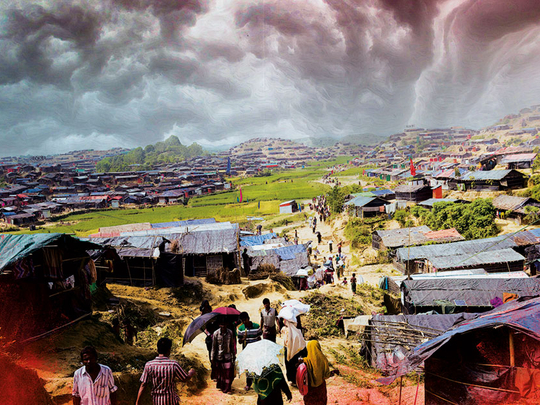
This month marks the first anniversary of the mass flight of Rohingya refugees into Bangladesh following attacks carried out by the Myanmar military in which thousands were killed. It also marks the peak of the monsoon season in Cox’s Bazar, where almost a million Rohingya people are now living in the largest refugee camps in the world.
The 2017 attacks by the Myanmar military were described by the UN high commissioner for human rights as “textbook ethnic cleansing”. He also said of the military campaign: “You cannot rule out the possibility that acts of genocide have been committed.”
While these attacks were the most systematic and the largest in scale, they were not the first. Attacks in 2012 and 2016 led to the internal displacement of more than 100,000 Rohingya people who continue to live in what are effectively prison camps with extremely limited access to food, health care and shelter, and to international humanitarian agencies. The Rohingya have faced systemic discrimination and exclusion for decades, being denied the recognition of their ethnicity and identity that would entitle them to equal rights.
In 2013 and 2017, I visited these internally displaced camps, where the situation continues to be dire and people still die needlessly because of the brutal restrictions imposed on their movement, and the lack of support desperately needed for survival.
The international community must take seriously the persecution of the Rohingya population by the Myanmar military, both before and after the transition to Aung San Suu Kyi’s administration, in which the Myanmar military continues to act with impunity. In the rush to support the transition to democracy, sanctions were lifted hastily, drastically reducing the leverage of the US and EU over the Myanmar government which still remains in the grip of the military.
Last month I visited the refugee camps in Cox’s Bazar in Bangladesh. As I arrived, it was hard to believe that hundreds of thousands of people live in only five sq miles. Tightly packed shelters of tarpaulin and bamboo stretched far into the distance. Some NGOs have even begun referring to Cox’s Bazar as the fourth largest city in Bangladesh.
Heavy rain has made the steep paths incredibly slippery and hard to navigate, and the ground was completely sodden. There were stories of people slipping off bamboo bridges and pregnant women being unable to visit medical facilities. As we walked past, a naked child was picked up by his friends after falling into the water and yellow mud.
There are 30,000 refugees at serious risk from landslides and in need of relocation. However, only 15,000 refugees have been moved so far. The day before, the main route leading to the camps was impassable for many hours, leaving NGOs unable to deliver supplies. Rains will only continue to worsen and the cyclone season will soon follow.
Mothers spoke to me of daughters being taken away, raped and killed, and of being separated from their families when fleeing from their attackers as homes were bulldozed. A father painfully told us how his son had been burnt to death in front of his him. “We want justice,” he added.
There has been much talk of return but this cannot happen without guarantees about security and rights to citizenship — otherwise people will be condemned to life in effective prison camps controlled by the very people who perpetrated the violence against them.
The international community also needs to hold the Myanmar military to account. Countries like Canada support referring the military to the International Criminal Court (ICC), and taking measures to preserve evidence of Myanmar’s heinous crimes.
Theresa May, the British Prime Minister, called explicitly last November for more action and said the humanitarian crisis “is something for which the [Myanmar] authorities — and especially the military — must take full responsibility”. She went on to pledge that Britain would “continue to play a leading role in bringing the international community together ... to do everything possible to stop this appalling and inhuman destruction of the Rohingya people”. While strong on providing humanitarian assistance, UK has not come close to putting real pressure on the Myanmar government and its military leader, Min Aung Hlaing.
If May means what she says, the UK government must support a referral of the Myanmar military to the ICC.
The world must not forget the plight of the Rohingya refugees in Bangladesh. Only one-third of the UN appeal for funding has been fulfilled, and the international community must urgently find a way to allow the Rohingya to rebuild their lives in safety and security.
— Guardian News & Media Ltd
Rushanara Ali is Labour MP for Bethnal Green and Bow in the UK.












